Unit 9 Can you come to my party? Section A Grammar Focus-3c 课件(共33张PPT)
文档属性
| 名称 | Unit 9 Can you come to my party? Section A Grammar Focus-3c 课件(共33张PPT) | 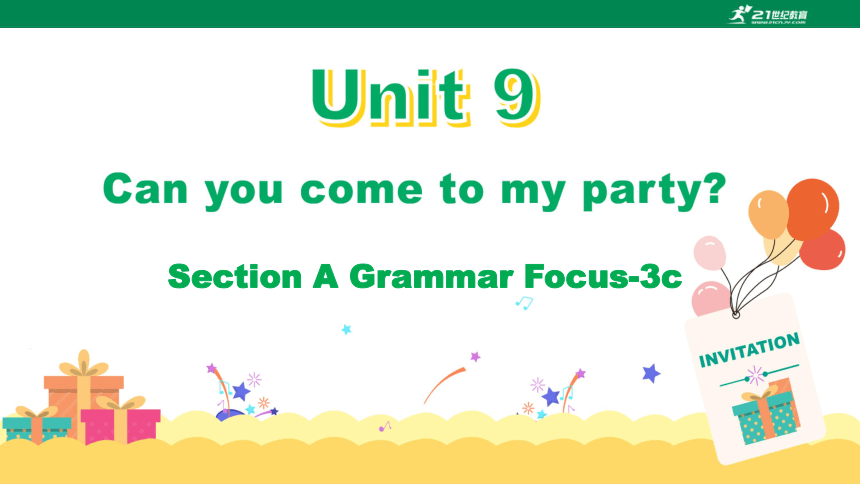 | |
| 格式 | pptx | ||
| 文件大小 | 1.8MB | ||
| 资源类型 | 试卷 | ||
| 版本资源 | 人教新目标(Go for it)版 | ||
| 科目 | 英语 | ||
| 更新时间 | 2022-11-26 21:45:27 | ||
图片预览

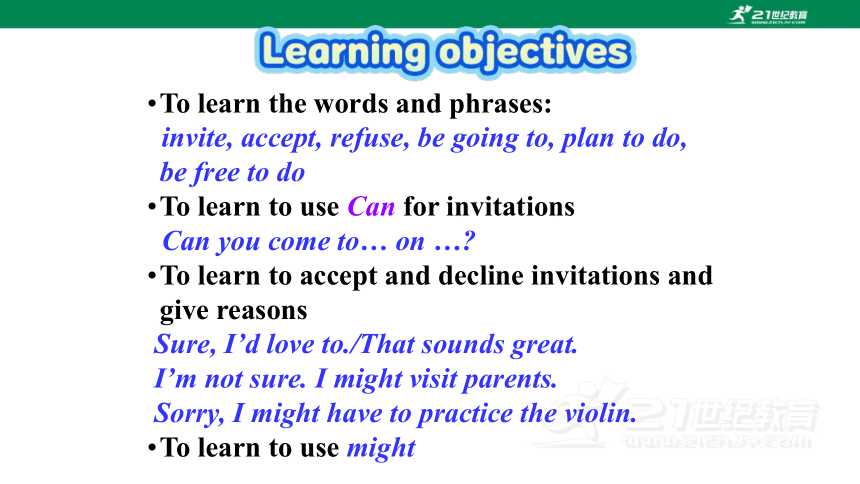
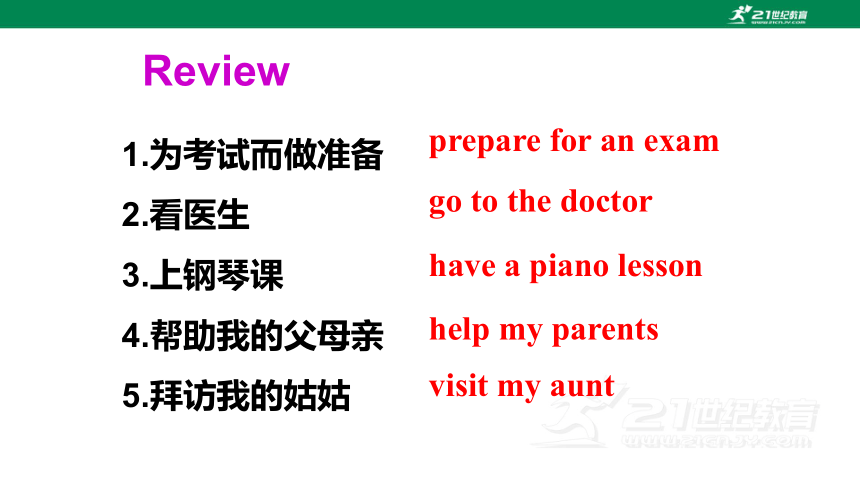
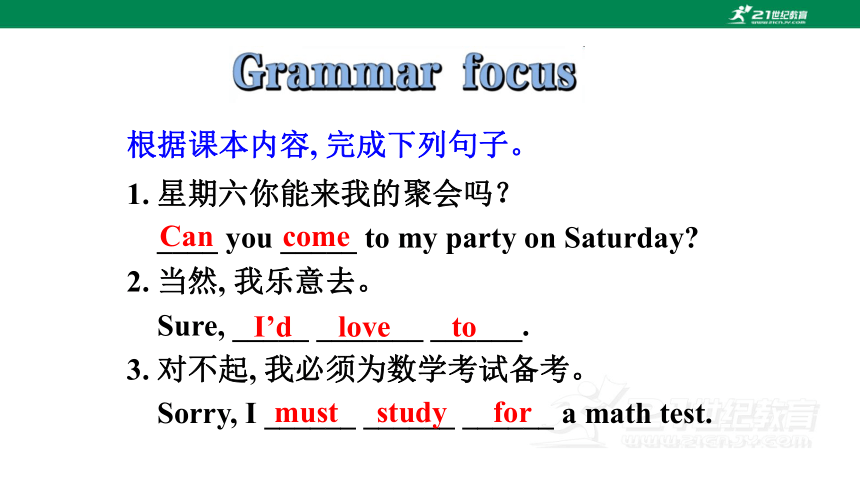
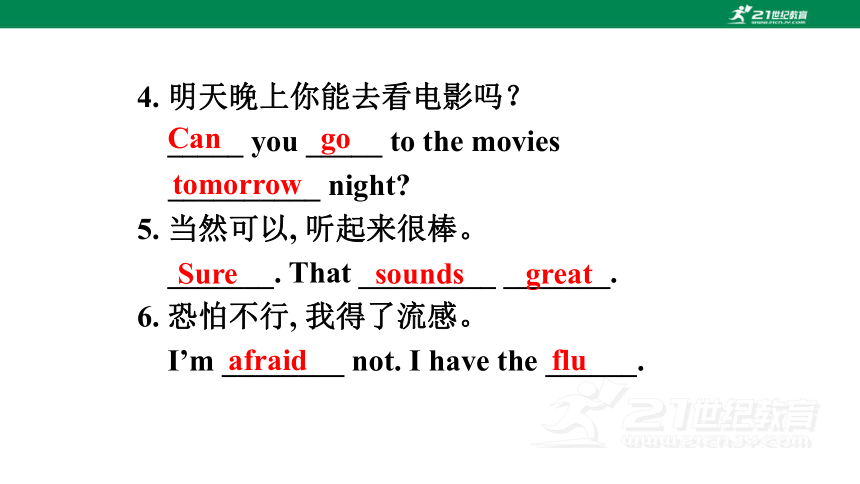
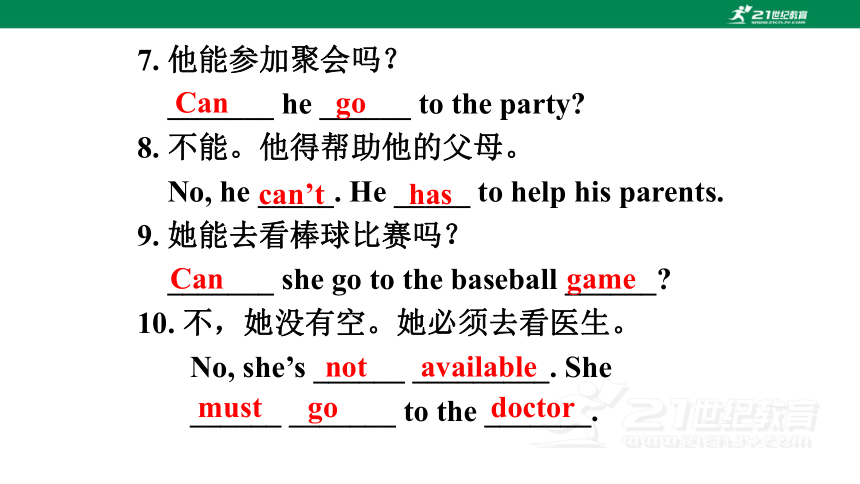
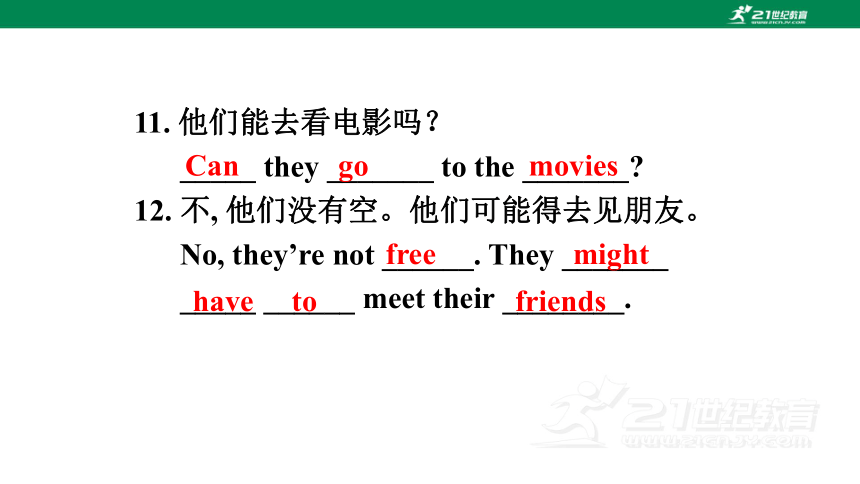
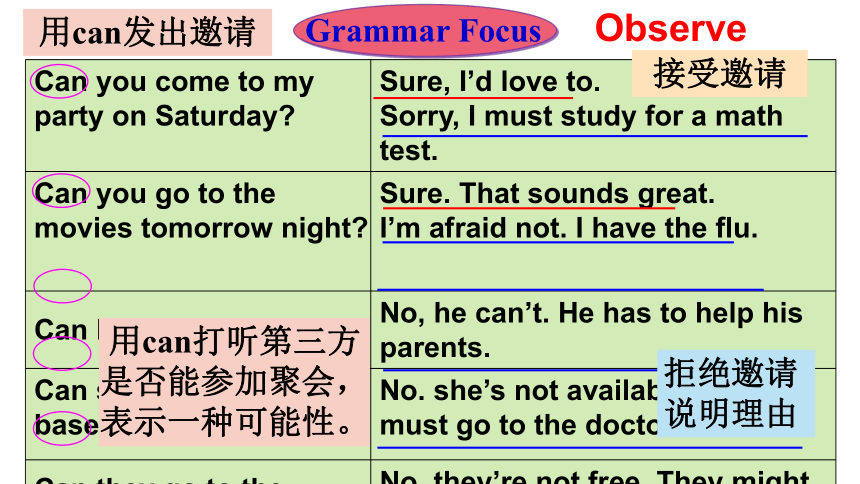
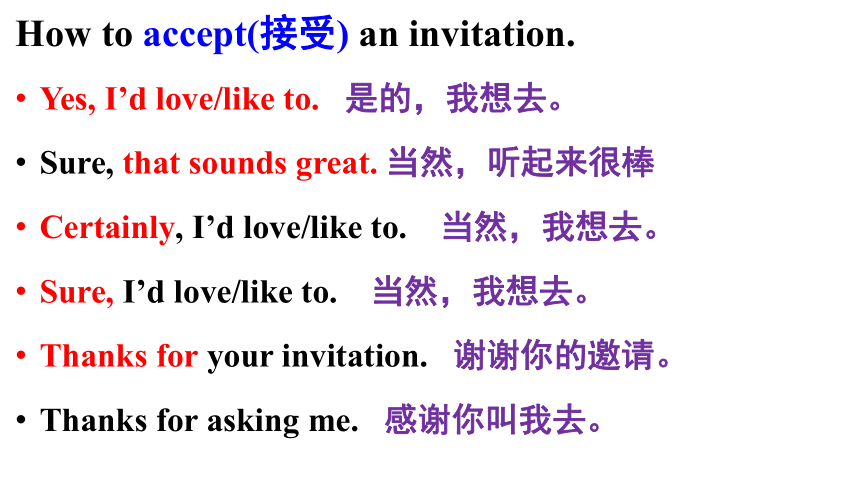
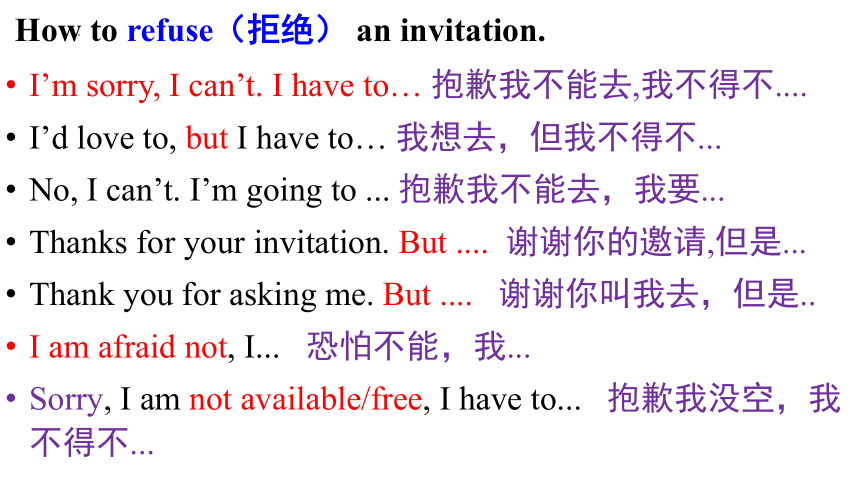
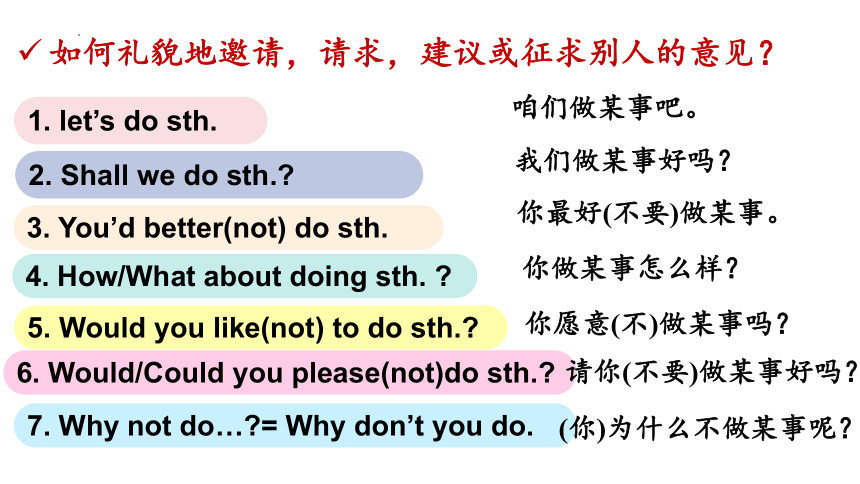
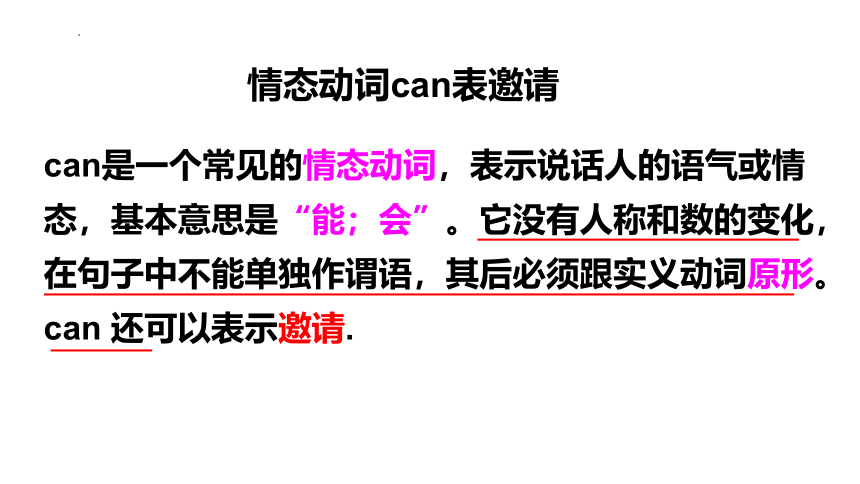
文档简介
(共33张PPT)
Section A Grammar Focus-3c
To learn the words and phrases:
invite, accept, refuse, be going to, plan to do, be free to do
To learn to use Can for invitations
Can you come to… on …
To learn to accept and decline invitations and give reasons
Sure, I’d love to./That sounds great.
I’m not sure. I might visit parents.
Sorry, I might have to practice the violin.
To learn to use might
Review
1.为考试而做准备
2.看医生
3.上钢琴课
4.帮助我的父母亲
5.拜访我的姑姑
prepare for an exam
go to the doctor
have a piano lesson
help my parents
visit my aunt
1. 星期六你能来我的聚会吗?
____ you _____ to my party on Saturday
2. 当然, 我乐意去。
Sure, _____ _______ ______.
3. 对不起, 我必须为数学考试备考。
Sorry, I ______ ______ ______ a math test.
I’d love to
Can come
must study for
根据课本内容, 完成下列句子。
4. 明天晚上你能去看电影吗?
_____ you _____ to the movies __________ night
5. 当然可以, 听起来很棒。
_______. That _________ _______.
6. 恐怕不行, 我得了流感。
I’m ________ not. I have the ______.
Can go
tomorrow
Sure sounds great
afraid flu
7. 他能参加聚会吗?
_______ he ______ to the party
8. 不能。他得帮助他的父母。
No, he _____. He _____ to help his parents.
9. 她能去看棒球比赛吗?
_______ she go to the baseball ______
10. 不,她没有空。她必须去看医生。
No, she’s ______ _________. She
______ _______ to the _______.
Can go
can’t has
Can game
not available
must go doctor
11. 他们能去看电影吗?
_____ they _______ to the _______
12. 不, 他们没有空。他们可能得去见朋友。
No, they’re not ______. They _______
_____ ______ meet their ________.
have to friends
Can go movies
free might
Can you come to my party on Saturday Sure, I’d love to.
Sorry, I must study for a math test.
Can you go to the movies tomorrow night Sure. That sounds great.
I’m afraid not. I have the flu.
Can he go to the party No, he can’t. He has to help his parents.
Can she go to the baseball game No. she’s not available. She must go to the doctor.
Can they go to the movies No, they’re not free. They might have to meet their friends.
Grammar Focus
Observe
用can发出邀请
用can打听第三方是否能参加聚会,表示一种可能性。
接受邀请
拒绝邀请
说明理由
How to accept(接受) an invitation.
Yes, I’d love/like to. 是的,我想去。
Sure, that sounds great. 当然,听起来很棒
Certainly, I’d love/like to. 当然,我想去。
Sure, I’d love/like to. 当然,我想去。
Thanks for your invitation. 谢谢你的邀请。
Thanks for asking me. 感谢你叫我去。
How to refuse(拒绝) an invitation.
I’m sorry, I can’t. I have to… 抱歉我不能去,我不得不....
I’d love to, but I have to… 我想去,但我不得不...
No, I can’t. I’m going to ... 抱歉我不能去,我要...
Thanks for your invitation. But .... 谢谢你的邀请,但是...
Thank you for asking me. But .... 谢谢你叫我去,但是..
I am afraid not, I... 恐怕不能,我...
Sorry, I am not available/free, I have to... 抱歉我没空,我不得不...
1. let’s do sth.
如何礼貌地邀请,请求,建议或征求别人的意见?
2. Shall we do sth.
咱们做某事吧。
5. Would you like(not) to do sth.
6. Would/Could you please(not)do sth.
7. Why not do… = Why don’t you do.
4. How/What about doing sth.
3. You’d better(not) do sth.
我们做某事好吗?
你最好(不要)做某事。
你做某事怎么样?
你愿意(不)做某事吗?
请你(不要)做某事好吗?
(你)为什么不做某事呢?
can是一个常见的情态动词,表示说话人的语气或情态,基本意思是“能;会”。它没有人称和数的变化,在句子中不能单独作谓语,其后必须跟实义动词原形。can 还可以表示邀请.
情态动词can表邀请
1. My brother can swim but I can’t.
表能力,“能够;会”
2. Can I borrow your new comic book
表许可,“可以;能够”
3. It can’t be Jack because he has gone to Shanghai.
表推测,常用于否定“不可能”
Let’s think
can的其他用法和含义
情态动词有:may/might(可能), can/could(可以), must(必须), have to(不得不), shall/ should(应该), will/would(将会), need(需要), dare(敢)
1.不能独立作谓语,只能和动词原形一起构成谓语,
表示说话人的语气和情态。
2. 没有人称和数的变化(即无三单形式)。(have to除外)
3. 否定形式:在其之后加not (have to除外)。
疑问形式:情态动词提到主语之前(have to 除外)。
1. can/may
都可表示“许可” 。may用于较正式、客气的场合,而can比较随便(口语)。
You may/can smoke here.
The policeman says you can’t park here.
2. 情态动词“have to”与其他的情态动词如“can”, “may”
“must” 和 “should” 不同。
1)这4个情态动词没有人称的变化,而have to有, 它的第三
人称单数为“has to” 如:
He should study hard.
He has to study hard.
3. must/have to
must 表示主观上觉得“必须...”;
have to表示客观需要,即“不得不” ,根据客观原因而不得不做某事。 但mustn't 表示禁止。
I don’t like this bike. I must buy a new one.
我不喜欢这辆自行车,我一定要买辆新的。
This bike doesn’t work. We have to buy a new one.
这辆自行车坏了,我不得不买一辆新的。
翻译下面的句子。
Would you like to come to my birthday party It’s at four thirty on Friday.
2. 你想参加我的生日聚会吗?是星期五的四点半。
1. 你周日能去我家吃晚饭吗?
随堂练习
Can you come to my house to
have a dinner on Sunday
— Can you come to my party
— I’m not sure. I might have to help my mom.
— Can she go to the movies
— No, she can’t. She’s playing soccer.
4. —她能去看电影吗?
—不,她不能,她正在踢足球。
3. —你能参加我的晚会吗?
—我不确定。我可能得帮助我妈妈。
3a
Complete the answers with might and one of the phrases in the box.
watch TV
on the weekend
my cousin
visit my grandparents
practice the violin
1. A: What are you going to do on
Saturday
B: I’m not sure. I might
_____________________
2. A: What are you planning to do
after school
B: I don’t know.
_____________________
visit my grandparents.
I might watch TV.
might 表示可能性,用于推测,比may的推测性更小
3. A: When will you finish the science homework
B:________________________________________
4. A: Who are you going to the movies with
B:____________________________________
5. A: Are you free to come to my place on Saturday
B: _______________________________________
I don’t know. I might finish it on the weekend.
I’m not sure. I might go with my cousin.
I’m not sure. I might have to practice the violin.
Let’s compare.
She received his present, but she didn't accept it.
So she refused it right away.
accept “(主观上愿意)接受”
receive “收到”客观上收到或拿到
refuse “拒绝”
refuse to do sth.
拒绝做某事
She refused to accept his present right away.
典题精炼
—I hear a car factory invited you to work for it.
—I didn’t _____ that. I’m not interested in cars.
A. accept B. serve C. refuse D. celebrate
3b
Complete the sentences below. Use the words in brackets to help you.
1. Inviting:_____________________________(can/play tennis)
Accepting:________________________________
2. Inviting:_______________________________________
(would like to/go to the movies)
Refusing:________________________________
Reason:__________________________________
(might have to)
Can you play tennis on Saturday
Sure. That sounds great.
Would you like to go to the movies on Friday
Sorry, I can’t.
I might have to go out with my parents.
3. Inviting: __________________________________
(can/hang out with us tonight)
Refusing: _________________________________
Reason: __________________________________(must)
4. Inviting: __________________________________
__________________________________
(would like to / come to my birthday party)
Accepting:________________________________
Can you hang out with us tonight
Would you like to come to my birthday
party
Sorry, I’m not free.
Sure, I’d love to.
I must study for a test.
3c
Write down everything you have to do next
week. Choose a day and time to have a party.
Then invite classmates to your party.
A: Can you come to my party
B: When is it
A: Next week, on Thursday night.
B: I’m sorry. I have to study for a math test.
Morning afternoon Evening
MON.
TUE.
WED.
THUR.
FRI.
SAT.
SUN.
Game time!
Make the chart quickly.
Try to fill the activities in the time period(6分钟)
Then, 10 of the 21 time periods will be blocked out at random(随机).
Please provide reasons for being busy during those blocked-out periods.
Summary
Can表示邀请的句型,might表推测
the way to accept and refuse an invitation
如何礼貌地邀请,请求,建议或征求别人的意见
一、单项选择
语法精练
1. —______ I swim here
—I’m sorry. Children _____swim alone. It’s dangerous.
A. Must; can’t B. Can; mustn’t
C. May; must D. Can’t; can
2. —Could you tell me how to pay for the food by QR
code on the phone —_____.
A. Take it easy B. It doesn’t matter
C. With pleasure D. You’re welcome
3. —Gina, could you please paly the drums on the art
festival
—_____. I can only play the guitar.
A. Can’t; can B. Yes, I can
C. Sure, I’d love to D. I’m afraid I can’t
4. —Would you like to play football after school
—_______. I have a lot of homework to do.
A. I’m afraid not B. Enjoy yourself
C. Take your time D. it takes no time
1. Thank you for (ask/ asking), but I can’t go to the movies with you.
2. Paul has to study (at/ for) the math test
tonight.
3. My sister has too (much/ many) homework
to do.
二、选择正确的选项填空。
asking
for
much
4. Can you come to my party (at/ on) Saturday night
5. She invites me (watch/ to watch) the basketball match the day after tomorrow.
6. I like playing (piano/ the piano).
on
to watch
the piano
谢谢
21世纪教育网(www.21cnjy.com)
中小学教育资源网站
兼职招聘:
https://www.21cnjy.com/recruitment/home/admin
Section A Grammar Focus-3c
To learn the words and phrases:
invite, accept, refuse, be going to, plan to do, be free to do
To learn to use Can for invitations
Can you come to… on …
To learn to accept and decline invitations and give reasons
Sure, I’d love to./That sounds great.
I’m not sure. I might visit parents.
Sorry, I might have to practice the violin.
To learn to use might
Review
1.为考试而做准备
2.看医生
3.上钢琴课
4.帮助我的父母亲
5.拜访我的姑姑
prepare for an exam
go to the doctor
have a piano lesson
help my parents
visit my aunt
1. 星期六你能来我的聚会吗?
____ you _____ to my party on Saturday
2. 当然, 我乐意去。
Sure, _____ _______ ______.
3. 对不起, 我必须为数学考试备考。
Sorry, I ______ ______ ______ a math test.
I’d love to
Can come
must study for
根据课本内容, 完成下列句子。
4. 明天晚上你能去看电影吗?
_____ you _____ to the movies __________ night
5. 当然可以, 听起来很棒。
_______. That _________ _______.
6. 恐怕不行, 我得了流感。
I’m ________ not. I have the ______.
Can go
tomorrow
Sure sounds great
afraid flu
7. 他能参加聚会吗?
_______ he ______ to the party
8. 不能。他得帮助他的父母。
No, he _____. He _____ to help his parents.
9. 她能去看棒球比赛吗?
_______ she go to the baseball ______
10. 不,她没有空。她必须去看医生。
No, she’s ______ _________. She
______ _______ to the _______.
Can go
can’t has
Can game
not available
must go doctor
11. 他们能去看电影吗?
_____ they _______ to the _______
12. 不, 他们没有空。他们可能得去见朋友。
No, they’re not ______. They _______
_____ ______ meet their ________.
have to friends
Can go movies
free might
Can you come to my party on Saturday Sure, I’d love to.
Sorry, I must study for a math test.
Can you go to the movies tomorrow night Sure. That sounds great.
I’m afraid not. I have the flu.
Can he go to the party No, he can’t. He has to help his parents.
Can she go to the baseball game No. she’s not available. She must go to the doctor.
Can they go to the movies No, they’re not free. They might have to meet their friends.
Grammar Focus
Observe
用can发出邀请
用can打听第三方是否能参加聚会,表示一种可能性。
接受邀请
拒绝邀请
说明理由
How to accept(接受) an invitation.
Yes, I’d love/like to. 是的,我想去。
Sure, that sounds great. 当然,听起来很棒
Certainly, I’d love/like to. 当然,我想去。
Sure, I’d love/like to. 当然,我想去。
Thanks for your invitation. 谢谢你的邀请。
Thanks for asking me. 感谢你叫我去。
How to refuse(拒绝) an invitation.
I’m sorry, I can’t. I have to… 抱歉我不能去,我不得不....
I’d love to, but I have to… 我想去,但我不得不...
No, I can’t. I’m going to ... 抱歉我不能去,我要...
Thanks for your invitation. But .... 谢谢你的邀请,但是...
Thank you for asking me. But .... 谢谢你叫我去,但是..
I am afraid not, I... 恐怕不能,我...
Sorry, I am not available/free, I have to... 抱歉我没空,我不得不...
1. let’s do sth.
如何礼貌地邀请,请求,建议或征求别人的意见?
2. Shall we do sth.
咱们做某事吧。
5. Would you like(not) to do sth.
6. Would/Could you please(not)do sth.
7. Why not do… = Why don’t you do.
4. How/What about doing sth.
3. You’d better(not) do sth.
我们做某事好吗?
你最好(不要)做某事。
你做某事怎么样?
你愿意(不)做某事吗?
请你(不要)做某事好吗?
(你)为什么不做某事呢?
can是一个常见的情态动词,表示说话人的语气或情态,基本意思是“能;会”。它没有人称和数的变化,在句子中不能单独作谓语,其后必须跟实义动词原形。can 还可以表示邀请.
情态动词can表邀请
1. My brother can swim but I can’t.
表能力,“能够;会”
2. Can I borrow your new comic book
表许可,“可以;能够”
3. It can’t be Jack because he has gone to Shanghai.
表推测,常用于否定“不可能”
Let’s think
can的其他用法和含义
情态动词有:may/might(可能), can/could(可以), must(必须), have to(不得不), shall/ should(应该), will/would(将会), need(需要), dare(敢)
1.不能独立作谓语,只能和动词原形一起构成谓语,
表示说话人的语气和情态。
2. 没有人称和数的变化(即无三单形式)。(have to除外)
3. 否定形式:在其之后加not (have to除外)。
疑问形式:情态动词提到主语之前(have to 除外)。
1. can/may
都可表示“许可” 。may用于较正式、客气的场合,而can比较随便(口语)。
You may/can smoke here.
The policeman says you can’t park here.
2. 情态动词“have to”与其他的情态动词如“can”, “may”
“must” 和 “should” 不同。
1)这4个情态动词没有人称的变化,而have to有, 它的第三
人称单数为“has to” 如:
He should study hard.
He has to study hard.
3. must/have to
must 表示主观上觉得“必须...”;
have to表示客观需要,即“不得不” ,根据客观原因而不得不做某事。 但mustn't 表示禁止。
I don’t like this bike. I must buy a new one.
我不喜欢这辆自行车,我一定要买辆新的。
This bike doesn’t work. We have to buy a new one.
这辆自行车坏了,我不得不买一辆新的。
翻译下面的句子。
Would you like to come to my birthday party It’s at four thirty on Friday.
2. 你想参加我的生日聚会吗?是星期五的四点半。
1. 你周日能去我家吃晚饭吗?
随堂练习
Can you come to my house to
have a dinner on Sunday
— Can you come to my party
— I’m not sure. I might have to help my mom.
— Can she go to the movies
— No, she can’t. She’s playing soccer.
4. —她能去看电影吗?
—不,她不能,她正在踢足球。
3. —你能参加我的晚会吗?
—我不确定。我可能得帮助我妈妈。
3a
Complete the answers with might and one of the phrases in the box.
watch TV
on the weekend
my cousin
visit my grandparents
practice the violin
1. A: What are you going to do on
Saturday
B: I’m not sure. I might
_____________________
2. A: What are you planning to do
after school
B: I don’t know.
_____________________
visit my grandparents.
I might watch TV.
might 表示可能性,用于推测,比may的推测性更小
3. A: When will you finish the science homework
B:________________________________________
4. A: Who are you going to the movies with
B:____________________________________
5. A: Are you free to come to my place on Saturday
B: _______________________________________
I don’t know. I might finish it on the weekend.
I’m not sure. I might go with my cousin.
I’m not sure. I might have to practice the violin.
Let’s compare.
She received his present, but she didn't accept it.
So she refused it right away.
accept “(主观上愿意)接受”
receive “收到”客观上收到或拿到
refuse “拒绝”
refuse to do sth.
拒绝做某事
She refused to accept his present right away.
典题精炼
—I hear a car factory invited you to work for it.
—I didn’t _____ that. I’m not interested in cars.
A. accept B. serve C. refuse D. celebrate
3b
Complete the sentences below. Use the words in brackets to help you.
1. Inviting:_____________________________(can/play tennis)
Accepting:________________________________
2. Inviting:_______________________________________
(would like to/go to the movies)
Refusing:________________________________
Reason:__________________________________
(might have to)
Can you play tennis on Saturday
Sure. That sounds great.
Would you like to go to the movies on Friday
Sorry, I can’t.
I might have to go out with my parents.
3. Inviting: __________________________________
(can/hang out with us tonight)
Refusing: _________________________________
Reason: __________________________________(must)
4. Inviting: __________________________________
__________________________________
(would like to / come to my birthday party)
Accepting:________________________________
Can you hang out with us tonight
Would you like to come to my birthday
party
Sorry, I’m not free.
Sure, I’d love to.
I must study for a test.
3c
Write down everything you have to do next
week. Choose a day and time to have a party.
Then invite classmates to your party.
A: Can you come to my party
B: When is it
A: Next week, on Thursday night.
B: I’m sorry. I have to study for a math test.
Morning afternoon Evening
MON.
TUE.
WED.
THUR.
FRI.
SAT.
SUN.
Game time!
Make the chart quickly.
Try to fill the activities in the time period(6分钟)
Then, 10 of the 21 time periods will be blocked out at random(随机).
Please provide reasons for being busy during those blocked-out periods.
Summary
Can表示邀请的句型,might表推测
the way to accept and refuse an invitation
如何礼貌地邀请,请求,建议或征求别人的意见
一、单项选择
语法精练
1. —______ I swim here
—I’m sorry. Children _____swim alone. It’s dangerous.
A. Must; can’t B. Can; mustn’t
C. May; must D. Can’t; can
2. —Could you tell me how to pay for the food by QR
code on the phone —_____.
A. Take it easy B. It doesn’t matter
C. With pleasure D. You’re welcome
3. —Gina, could you please paly the drums on the art
festival
—_____. I can only play the guitar.
A. Can’t; can B. Yes, I can
C. Sure, I’d love to D. I’m afraid I can’t
4. —Would you like to play football after school
—_______. I have a lot of homework to do.
A. I’m afraid not B. Enjoy yourself
C. Take your time D. it takes no time
1. Thank you for (ask/ asking), but I can’t go to the movies with you.
2. Paul has to study (at/ for) the math test
tonight.
3. My sister has too (much/ many) homework
to do.
二、选择正确的选项填空。
asking
for
much
4. Can you come to my party (at/ on) Saturday night
5. She invites me (watch/ to watch) the basketball match the day after tomorrow.
6. I like playing (piano/ the piano).
on
to watch
the piano
谢谢
21世纪教育网(www.21cnjy.com)
中小学教育资源网站
兼职招聘:
https://www.21cnjy.com/recruitment/home/admin
同课章节目录
- Unit 1 Where did you go on vacation?
- Section A
- Section B
- Unit 2 How often do you exercise?
- Section A
- Section B
- Unit 3 I'm more outgoing than my sister.
- Section A
- Section B
- Unit 4 What's the best movie theater?
- Section A
- Section B
- Unit 5 Do you want to watch a game show?
- Section A
- Section B
- Unit 6 I'm going to study computer science.
- Section A
- Section B
- Unit 7 Will people have robots?
- Section A
- Section B
- Unit 8 How do you make a banana milk shake?
- Section A
- Section B
- Unit 9 Can you come to my party?
- Section A
- Section B
- Unit 10 If you go to the party, you'll have a grea
- Section A
- Section B
